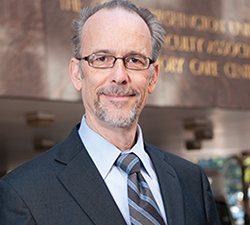Lawrence Deyton asks that you call him by his nickname, Bopper. After all, it’s what his family, friends, and colleagues have always called him. “I didn’t even know about the name Lawrence until I got to junior high school,” insists Deyton. “My mother and older sister sat me down and told me that Bopper was a nickname given to me as an infant and the name just stuck.” Whatever you call him, returning to the George Washington University (GW) is returning home for Lawrence “Bopper” Deyton, M.D. ’85, who has joined GW’s School of Medicine and Health Sciences (SMHS) faculty as a clinical professor of medicine. He will also serve as a professor of health policy at the GW School of Public Health and Health Services.

and Health Services.
Driven by his passion for a healthier United States, Deyton brings to the university more than 30 years of experience in federal public health, health policy, health system administration, and clinical research. Deyton held leadership positions at the National Institute of Allergy and Infectious Diseases at the National Institutes of Health for 11 years, and served as the chief public health and environmental hazards officer for the U.S. Department of Veterans Affairs’ Veterans Health Administration. And in the 1970s he co-founded the Whitman-Walker Clinic in Washington, D.C.
More recently, as the first director of the Center for Tobacco Products at the U.S. Food and Drug Administration (FDA), Deyton led the creation of the science, regulatory, and enforcement foundation for implementing the Family Smoking Prevention and Tobacco Control Act. The act was signed into law by President Barack Obama on June 22, 2009, becoming one of the president’s first major public health accomplishments. Deyton led the implementation of rules and regulations that prohibited marketing tobacco products to children and adolescents; prohibited the manufacture and sale of cigarettes with fruit or candy flavors; banned the use of misleading descriptors (“light,” “low,” or “mild”); enacted requirements for disclosure of tobacco product ingredients to the FDA, and set the scientific standards for the introduction of new or modified-risk tobacco products.
Being back at GW, Deyton is most excited about engaging with students, trainees, and faculty. “I want to help mold medical students into highly trained clinicians who can also be leaders in health policy and public health,” says Deyton. Last summer, Jeffrey S. Akman, M.D. ’81, G.M.E. ’85, vice president for health affairs and dean of SMHS, asked Deyton to serve as the keynote speaker for the M.D. White Coat ceremony. Honored by Akman’s invitation, Deyton says the experience transformed him. “Walking up to that podium in Lisner Auditorium, the very place where I took my Hippocratic Oath, was an extremely powerful moment for me,” he recalls.
So much has changed at GW since those days when he was a medical student. The biggest difference, according to Deyton, is the university’s growth. “When I came to GW, where the GW Hospital is now was a parking lot and the space that was the GW Hospital is now Whole Foods,” recalls Deyton
There is no doubt that Deyton is excited to be back in the classroom. “Hopefully GW students can benefit from my experiences in medicine, public health, and health policy,” he said. “I want to encourage our trainees and faculty to take full advantage of GW’s status as ‘neighbor’ to the White House and the decision makers in the federal agencies,” said Deyton. “It is great to be back home.”
Related Content



